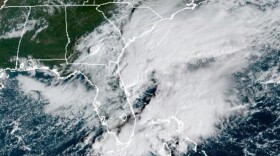As rip tides from Hurricane Erin create dangerous conditions along the North Carolina coast, many residents and visitors have evacuated the Outer Banks, and local officials have warned people to stay away from the beaches.
Erin lost strength early Tuesday and dropped to a Category 2 hurricane with maximum sustained winds of 105 miles per hour, according to the National Hurricane Center in Miami. It was 690 miles south-southeast of Cape Hatteras. Forecasters said Erin was moving northwest at 9 miles per hour.

While Erin is not expected to make landfall, it's still expected to cause dangerous rip currents and could swamp roads with waves up to 15 feet. That could lead to some structural damage along the county's vulnerable dune front, said Drew Pearson, Dare County's Emergency Management Director.
"It will also bring significant amounts of water onto NC-12, the only road that services Hatteras Island," Pearson said in a briefing Monday morning. "There is a high potential NC-12 will be closed for significant periods of time that will limit the ability to respond to emergencies on Hatteras Island, putting people at risk."
Gov. Josh Stein declared a State of Emergency on Tuesday as North Carolina prepares for the impact of the storm. Stein will hold a briefing to provide updates on the storm on Wednesday at 10:15 a.m.
While the State of Emergency is in effect, Blue Cross NC is allowing its customers anywhere in the state early prescription refills through Sept. 17.
Visitor evacuations took place Sunday and Monday, while residents are evacuating Tuesday under mandatory orders from Dare and Hyde counties. Major impacts are expected to occur Tuesday following high tide, peaking Wednesday into Thursday and tapering off on Friday, according to state officials.
Beaches in North Carolina are closed or have issued a "no swim advisory" due to dangerous rip currents from Hurricane Erin. Cape Hatteras National Seashore has closed its beach accesses and facilities on Hatteras and Ocracoke islands through Thursday. Onslow Beach is also closed. Wrightsville Beach has issued a "no swim advisory" through Friday.
At least 60 people were rescued from rip currents in Wrightsville Beach on Monday, officials said. This year, there have been at least 27 people killed from rip currents in U.S. waters according to the National Weather Service. About 100 people drown from rip currents along U.S. beaches per year, according to the United States Lifesaving Association.

Projected forecast in the Triangle
The National Weather Service expects that Erin will have very little impact to the NC Triangle this week, beyond some mildly strong winds and a chance of light rain. Meteorologists forecast gusts as high as 18 miles per hour on Thursday.
Although Erin is the first Atlantic hurricane of the year, there have been four tropical storms this hurricane season already. Tropical Storm Chantal made the first U.S. landfall of the season in early July, and its remnants caused flooding that displaced residents and caused damage to businesses in Orange and Alamance counties. Flooding from Chantal also killed an 83-year-old woman in Chatham County when her car was swept off a rural road.
College of the Albemarle delays its opening
The College of the Albemarle has delayed the start of its fall semester due possible impacts from Hurricane Erin.
According to a social media post, the college delayed that start date at least until Wednesday. All COA locations are closed in Elizabeth City, Currituck, and Edenton. It also mentioned that it would place phones on a closed message on Tuesday and Wednesday.
The college will provide an update on Thursday regarding operations.
Eli Chen contributed to this report.








